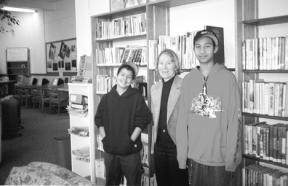As the economy forces budget cuts, we are warned from many sources that education is in trouble, nationally and locally. The good news is that there is one program in our local schools that is growing, blooming and expanding.
The thriving mentoring program exists in all South Whidbey schools, but has been especially successful at Langley Middle School. Sponsored by the South Whidbey Youth Center, the program is made possible by community volunteers who come to the school to work with students.
“Currently there are 45 middle school students in mentoring,” said Kathy Hein, the program’s coordinator. Hein has the energy, enthusiasm and knowledge to keep the program going and growing. She is particularly gratified that the program has expanded for the first time into South Whidbey High School and Langley Christian School.
“There are 11 students at the high school, and one at Langley Christian,” Hein said. “And there are 55 volunteers.”
Those volunteers have a wide variety of backgrounds and span a broad range of ages. The parental group manages somehow to squeeze extra time from their busy work schedules. The volunteers from AmeriCorps, who have recently received their college degree or are in the process of getting one, are a true inspiration to the young students. Those who are retired may have had prestigious educational backgrounds, or they may be average grandmas and grandpas.
Volunteers each have individual reasons for giving their time, but the older people in the mentoring program unanimously say that mentoring stretches their minds and helps keep them young.
“I have to keep up with the latest in math and other subjects so I can teach them to the youngsters who are in my care,” said one senior.
Herb Lindahl is a retiree who comes to the Middle School on Island Transit twice a week at 8:15 a.m.
“These young people can find it difficult to keep their focus with the many changes going on in their bodies and lives,” Lindahl said. “They carry around heavy backpacks and don’t know what’s in them or how to use it. They just get disorganized and need help in pulling it together.”
Lindahl put a fond hand on the shoulder of the young man sitting next to him.
“Bryce and I have worked together for three years and he has made tremendous progress,” Lindahl said. “He’ll be going to high school next year and will do just fine.”
Bryce smiled back and said, “Yeah, we talk a lot, we’re good friends. I’m going out for football next year. I’ll be getting good grades.”
Most of the mentoring takes place in the school library. In one corner, Katie Scott, a retired teacher, was sitting at a table with two young men. She explained they had both needed help with English as a Second Language, which is her special interest.
Felipe is from Colombia, but after working with Scott he has little problem with his English.
“We lived in a small town surrounded by guerilla fighters and were very frightened we’d be killed,” Felipe said about his earlier years. “My father came to this country and as soon as he had enough money, he sent for my mother and me and my little brother. It was scary coming here and starting school when I didn’t know the language.”
The other young man, Tom, who is tall for his age, is from Thailand.
“I didn’t want to come to school at first,” he said, “but now I like it and I do all the after-school sports. I hope I can make the basketball team next year.”
Scott and the two boys have been together for a year-and-a-half and these young men have done very well, she said.
“The key is really ‘organization,’ and I help them see how they can make their brain work for them,” Scott said.
Sharon Edwards, member of the LMS staff who oversees all that goes on in the library, thoroughly believes in the mentor program.
“I see the students as they first come in for mentoring — they are shy and lack confidence,” Edwards said. “Then I watch them change and in only a few weeks they are coming early for their appointment, eager to see their mentor. A trusting relationship forms and now the program has been expanded so that the mentor and the student can go on together to high school. It is very touching.”
Anne Hartley, another mentor, was in the main building because she works in the classrooms assisting during math lessons. She looked happy as she got ready to leave for home.
“This is great fun. I love it,” Hartley said. “I can catch the kids before they start falling behind as I wander around the room checking how they are doing and perhaps help them work through a math problem. Also, I’m supporting and helping the teacher by keeping the class focused during the lesson. There are a lot of distractions for kids this age.”
Hein noted that a Homework Club has started this year, meeting after school on Wednesdays. Already there are 20 students and four to five volunteers.
“The most rewarding part is that the program has become accepted by the students,” Hein said. “They have seen the changes that occur in participating students and now seem grateful that mentoring is available. It is not infrequent that a request will come directly from a student.”



